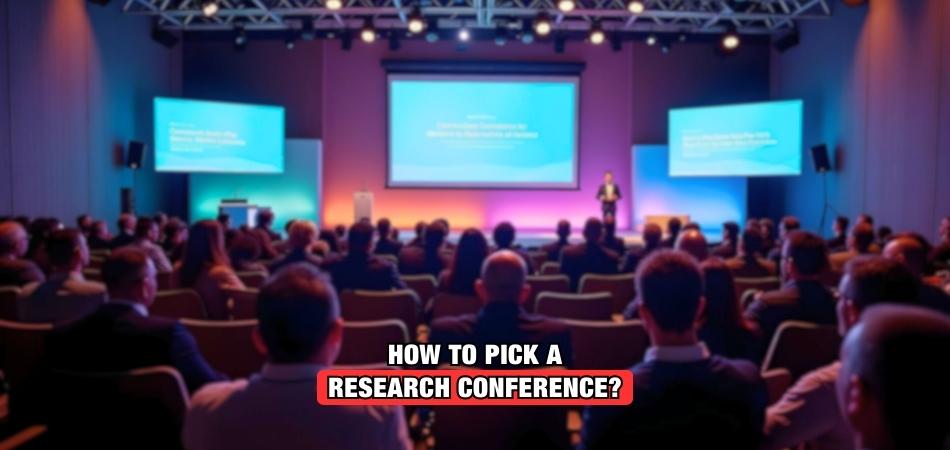Research conferences are gatherings where scholars share findings, exchange ideas, and network. These events advance knowledge and encourage collaborations across various fields. Attending the right conference can significantly impact your academic and professional journey. But with so many options available, how to pick a research conference?
Consider the relevance to your field and the conference’s reputation. Look into networking opportunities and see if you can present your work. Explore funding options, and make sure the location and timing fit your schedule.
Think about your personal goals and how attending will benefit your growth. Ready to make the best choice? Find out how to choose the perfect conference for you by reading on.
What the Research Conference is About?
A research conference brings together experts from a variety of fields to discuss the latest findings in their fields. This gathering aims to share knowledge and promote collaborations. Experts present their work, leading to valuable discussions. Participants gain insights into new methods, technologies, and ideas for their future research.

The event invites professionals, students, and others to learn from the experiences of well-known researchers. Presentations, workshops, and question-answer sessions make the conference highly interactive. It’s also a good platform for young researchers to meet experienced scientists and get their opinions.
Additionally, the research conference offers a venue for demonstrating cutting-edge technologies. This helps researchers understand how tools work and how to apply them in their work. Attending these events can help researchers broaden their vision and help them become better contributors to their field.
Research conferences are held worldwide, including in places like California, Arizona, New Mexico, and Texas. Among them, Mexico is a popular destination for such events, attracting researchers and professionals globally. This year, the upcoming conferences in Mexico will cover topics like sustainable technology, emerging trends, and global challenges, making them essential for learning and networking.
Who Gets Benefited From Attending Research Conferences?
Participating in research conferences offers valuable benefits for a wide range of people involved in academia and industry. It’s not just about listening to presentations; it’s a chance to grow, connect, and learn. Let’s explore who gains the most from these gatherings.
Early-Career Researchers
New researchers gain exposure to current work, helping them refine their own studies. Conferences provide the opportunity to meet established professionals. This boosts their confidence and opens doors for mentorship. It’s a great way to learn from others’ experiences firsthand.
Experienced Academics
Researchers with experience keep abreast of the most recent developments in their field. They can present their work and gain peer feedback. Networking with other experts fosters potential collaborations on future projects. Sharing their knowledge strengthens their professional standing.
Industry Professionals
For professionals outside academia, conferences reveal cutting-edge research with practical applications. Attendees discover innovative techniques they can integrate into their work. Networking here leads to partnerships and business opportunities. They also gather insights to improve their organization’s strategies.
Students
Introduction to real-world research and professional settings benefits students. Participating in helps them identify potential career paths or research interests. They get inspired by seeing where their education could lead. These experiences build valuable connections for future endeavors.
Research conferences provide a shared space for people across experience levels to learn and grow. Whether you’re just starting or well into your career, these events offer unmatched opportunities to expand your horizons.
How to Pick a Research Conference?
Choosing the right research conference is an essential decision that can shape your academic and professional growth. With so many conferences available, it’s important to take a thoughtful approach to ensure you maximize the benefits. Follow this step-by-step guide to help you select the best conference for your needs.
Step 1: Assess Relevance to Your Research
Ensure the conference aligns with your field of study and research interests. A good fit will help you stay engaged with the topics discussed. Conferences that focus on your subfield will offer the most value. Broader conferences might still provide insights but could feel less targeted.
Step 2: Analyze the Conference’s Reputation
Research the credibility of the organizing body to gauge the event’s quality. Established academic institutions and professional societies typically host reputable conferences. Check past editions for speaker quality and attendee feedback. This gives you a good idea of the event’s overall impact.
Step 3: Consider Networking Opportunities
Look into who typically attend the conference—mixes of researchers, industry experts, and students are ideal. Conferences offering workshops and panels provide extra networking and learning chances. Consider whether the event includes structured opportunities to connect. Networking could lead to collaborations or mentorship.
Step 4: Check Location and Logistics
The venue’s location should be accessible and within your budget to avoid unnecessary stress. If considering international conferences, account for travel costs and visa requirements. Timing is also important—ensure the dates don’t clash with other important obligations. Choosing the right location adds comfort to your experience.
Step 5: Look for Presentation Opportunities
Find out if there’s a call for papers where you can present your research. Presenting offers visibility and valuable feedback from peers. Some conferences also offer opportunities for publishing in proceedings or journals. This boosts your academic profile and validates your work.
Step 6: Explore Funding and Grants
Check if the conference offers travel grants or financial support, which can make attendance more feasible. Also, research if your institution provides funding for conference participation. Financial aid can remove barriers and allow you to attend otherwise costly events. Proper planning ensures affordability.
Step 7: Align With Personal and Professional Goals
Your career stage will determine the type of conference that benefits you most. Early-career researchers might benefit from smaller, focused events, while experienced academics may prefer larger, international conferences. Define what you hope to achieve—learning, networking, or presenting. Being clear about your goals helps in making the best decision.
Choosing the right research conference is vital for academic growth, networking, and visibility. Align your goals with conference opportunities, and explore the available ways to get conferences to attend that fit your needs and budget.
Why Should You Attend a Research Conference?
Participating in a research conference opens doors to new ideas, networking, and learning. It’s an opportunity to stay current in your field while expanding your professional network. Here’s why it is essential for growth in academia and industry.
Networking Opportunities
Research conferences connect you with experts and peers who share your interests. This presents the chance to build meaningful relationships and exchange ideas. Networking helps you learn about new research, discover career opportunities, and find potential collaborators. The connections you make can support your professional development and lead to exciting future projects.
Introduction to New Ideas
Conferences introduce you to fresh concepts and the latest research trends. Researchers often present groundbreaking findings, which can inspire you to explore new areas. This exposure helps you expand your knowledge and adopt innovative approaches in your work. Staying open to new ideas fosters creative thinking and keeps you engaged in your field.
Personal and Professional Growth
Presenting your research at a conference builds confidence and sharpens your communication skills. You’ll receive feedback from experts, which can refine your ideas and improve your work. Attending diverse sessions broadens your knowledge and contributes to your personal growth. Conferences challenge you to develop new skills and stay competitive in your field.
Stay Updated on Industry Trends
You can stay up to date on the most recent advancements and trends in your field by attending conferences. You can learn about new tools, technologies, and methodologies that could influence your work. Staying updated ensures you remain competitive and can adapt to evolving industry standards. Conferences are essential for understanding where your field is headed and positioning yourself accordingly.
Collaboration and Funding Opportunities
Meeting researchers who share your interests at conferences is a great opportunity for collaboration. These interactions can lead to valuable partnerships and joint projects. Conferences also offer opportunities to connect with funding agencies looking to support innovative research. These connections can help secure financial support for future research initiatives or provide access to new resources.
Participating in a research conference is a valuable experience for researchers. It provides opportunities to learn, network, and grow professionally. Engaging with new ideas and experts can enhance your research and help shape your future career path.
What Are the Best Ways to Stay Current With the Latest Trends in My Area of Study?
Staying updated with trends in your field can help you grow as a professional and expand your knowledge. You need strategies that provide reliable information and foster continuous learning to stay ahead in the expanding academic field.
Follow Reputable Journals and Publications
Reading recognized journals in your field keeps you informed about the latest research and breakthroughs. Subscribing to newsletters or online platforms ensures you never miss key updates. Experts often share summaries that help you grasp complicated ideas without spending too much time.
Attend Academic Conferences Regularly
Conferences provide opportunities to meet experts and learn new research findings in your area of study. Participating actively can expand your network and expose you to diverse ideas. These events often focus on the most current innovations and approaches relevant to your discipline.
Use Online Platforms for Updates
Educational platforms, blogs, and forums can help you stay aware of emerging trends in your area. If you’re a PhD candidate, conferences become a great way to expand your knowledge, and there are several steps to find PhD conferences that specifically fit your academic needs. These platforms simplify the process of staying informed about relevant opportunities.
Join Professional Societies and Networks
Becoming a part of professional societies connects you with people who share your field of interest. These groups provide regular updates, organize events, and create spaces for exchanging ideas. Staying engaged with such networks often leads to meaningful collaborations and discoveries.
Use Digital Tools and Resources
Online tools like alerts, curated newsletters, and trending topic trackers ensure you don’t miss critical updates. Apps designed for academic use can organize your learning schedule. These resources are essential for keeping track of industry-specific advancements and opportunities.
Using these methods consistently will help you stay knowledgeable and engaged in your academic career. Combining diverse strategies ensures you always stay updated and are prepared for meaningful contributions in your field.
What are the Effective Methods of Networking at Research Conferences?
At research conferences, networking is a crucial ability that can lead to future opportunities, mentorships, and collaborations. With the right approach, you can make meaningful connections that will benefit your academic and professional growth. Here are some effective methods to enhance your networking experience.
Attend Workshops and Panels
Workshops and panels provide intimate settings where you can engage with speakers and participants. These smaller groups encourage interactive discussions and deeper connections. Asking thoughtful questions helps you stand out in the crowd. Conversations often continue beyond the session, building lasting relationships.
Participate in Networking Events
Conferences usually offer structured networking sessions, such as coffee breaks or evening mixers. These are ideal opportunities to meet new people in a casual environment. Introduce yourself to others and exchange contact information. Take the initiative to follow up on meaningful conversations after the event.
Prepare an Elevator Pitch
Having a short, clear introduction about your research helps make a strong first impression. Prepare a concise summary of your work to share with new contacts. Focus on the key points and avoid jargon. Being ready to explain your research makes networking more effective and engaging.
Use Social Media
Make use of social media sites like LinkedIn and Twitter to establish connections with other conference participants prior to, during, and following the event. Join event hashtags and participate in online discussions related to the conference. Follow up with people you meet to continue the conversation. This online presence extends your networking reach beyond the event.
Approach Speakers and Panelists
Speakers and panelists are often open to connecting with attendees after their presentations. Approach them with thoughtful questions or comments about their talk. A meaningful conversation can leave a lasting impression. Don’t hesitate to ask for their contact details for future discussions.
Tips to Utilize the Research Conference for Your Professional Growth
Your professional development can be greatly enhanced by attending a research conference, but only if you know how to make the most of it. With the right strategies, you can turn this experience into a career-advancing milestone. Here are some practical tips to make the most of it.
- Set Clear Goals Before Attending: Decide what you want to achieve—whether it’s learning new techniques or networking. Clear objectives help you stay focused throughout the conference.
- Engage in Active Listening During Sessions: Take notes during presentations and ask questions that clarify your understanding. Engaging with content deepens your learning and retention of new ideas.
- Follow Up on Networking Opportunities: After meeting new contacts, send a brief message to maintain the connection. Following up shows initiative and strengthens relationships.
- Present Your Work, If Possible: Submitting your research for presentation increases your visibility and credibility. It also invites valuable feedback that can refine your ideas.
- Attend Informal Events and Social Gatherings: Participating in social mixers or coffee breaks creates a relaxed setting for networking. These moments often lead to deeper, lasting connections.
Frequently Asked Questions About How to Pick a Research Conference?
Selecting the right research conference can be a challenging decision, but it’s essential for your academic and professional growth. Below are seven frequently asked questions to help guide your selection process and ensure you maximize the experience.
How Do I Find Upcoming Research Conferences in My Field?
You can find upcoming research conferences through academic journals, university departments, and professional organizations in your field. Websites like Global Conference Alliance Inc. and professional networks also provide updated information about relevant events and their submission deadlines.
Should I Prioritize Smaller, Niche Conferences Over Large, General Conferences?
It depends on your goals. Smaller conferences provide more focused content and personalized networking, while larger events offer broader exposure and opportunities. Both types of conferences have unique benefits, so consider what aligns best with your current academic or career needs.
How Important Are the Speakers and Keynotes?
Speakers and keynote presentations set the tone for the conference’s quality and focus. Reviewing the lineup helps determine if the content will be valuable. Established, well-known speakers often indicate a conference’s strong reputation and relevance to your research.
What Role Does Conference Location Play in My Decision?
Location affects the logistical ease, cost, and accessibility of attending a conference. International events can offer unique networking opportunities, but domestic options might be more affordable. Consider your budget, travel restrictions, and the benefits of each location.
Can I Attend a Conference Without Presenting Research?
Yes, many conferences welcome attendees without requiring a presentation. Even without presenting, you can gain valuable knowledge, make connections, and participate in workshops or panels. However, presenting can boost your visibility and provide feedback on your work.
How Can I Determine If a Conference Has Long-Term Impact?
Look for conferences that lead to collaborations, publications, or continued learning opportunities. A strong long-term impact often comes from events where you build lasting professional connections. Review past attendee experiences and research the conference’s influence on the field.
Should I Choose a Conference Based on Career Stage?
Yes, your career stage should influence your choice. Early-career researchers may benefit from smaller, focused conferences, while established professionals might seek larger, international events. Tailoring your choice ensures the conference aligns with your career development goals.
Endnotes
The experience of attending a research conference can be beneficial for both your academic and professional careers. It offers unique opportunities to expand your knowledge, present your work, and build valuable connections. To make the most of it, knowing how to pick a research conference is essential.
Consider factors like the conference’s relevance to your field, reputation, and networking potential. Ensure the event aligns with your personal goals and logistical needs. By thoughtfully choosing the right conference, you’ll enhance your career, broaden your horizons, and make meaningful contributions to your research community.







